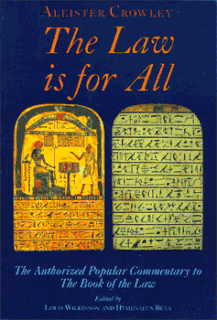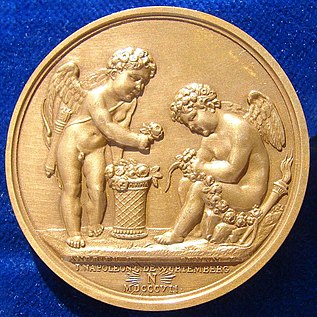This page is based on this
Wikipedia article Text is available under the
CC BY-SA 4.0 license; additional terms may apply.
Images, videos and audio are available under their respective licenses.

Urania was, in Greek mythology, the muse of astronomy.

Ordo Templi Orientis (O.T.O.) is an international fraternal and religious organization founded at the beginning of the 20th century by Carl Kellner and Theodor Reuss. English author and occultist Aleister Crowley is the best-known and most influential member of the order.
In demonology, Amaymon is a Prince of Hell, and, according to some Grimoires, the only one who has power over Asmodai.
The number 93 is of great significance in Thelema, founded by English author and occultist Aleister Crowley in 1904 with the writing of The Book of the Law.
William Breeze is an American author and publisher on magick and philosophy. He is the current international leader of Ordo Templi Orientis and in this capacity is a leading editor of the occult works of Aleister Crowley, the founder of the philosophy and religion of Thelema who is regarded as its prophet. Under the name Hymenaeus Beta he is a successor of Grady McMurtry who was the first of the caliphs to succeed the Thelemic prophet Aleister Crowley and served as the Outer Head of Ordo Templi Orientis from 1971 until 1985.

Christopher Hyatt, born Alan Ronald Miller, was an American occultist, author, and founder of the Extreme Individual Institute (EII). He is best known as president of New Falcon Publications.

The Law is for All is a collection of Aleister Crowley's commentary on The Book of the Law, the central sacred text of Thelema. It was edited to be a primer of sorts into Crowley's general interpretations about the sometimes opaque text of Liber Legis. For this reason, the book omits many of the more complex qabalistic explanations that lean heavily on an understanding of gematria and The Tree of Life. As the original editor, Louis Wilkinson, wrote in his introduction (p. 17):
The aim of the Commentary on the Book of the Law is to guide the reader along the path of the discovery of his own true will, in accordance with which, and only in accordance with which, he can rightly think and act. This is why "Do what thou wilt shall be the whole of the Law." Only by doing so will you be shown your own true thought and life.
The Deutsches Derby is a Group 1 flat horse race in Germany open to three-year-old thoroughbred colts and fillies. It is run at Hamburg-Horn over a distance of 2,400 metres, and it is scheduled to take place each year in July.
In Greek mythology, Magnes was a name attributed to two men.
Alexander was a Christian heretical teacher in Ephesus. Hymenaeus and Alexander were proponents of antinomianism, the belief that Christian morality was not required. They put away—"thrust from them"—faith and a good conscience; they wilfully abandoned the great central facts regarding Christ, and so they "made shipwreck concerning the faith."
Philetus was an early Christian mentioned by Paul, who warns Timothy against him as well as against his associate in error, Hymenaeus. The apostle speaks of Hymeneus and Philetus as instances of men who were doing most serious injury to the church by their teaching, and by what that teaching resulted in, both in faith and morals. The specific error of these men was that they denied that there would be any bodily resurrection. They treated all Scriptural references to such a state, as figurative or metaphorical. They spiritualized it absolutely, and held that the resurrection was a thing of the past. No resurrection was possible, so they taught, except from ignorance to knowledge, from sin to righteousness. There would be no day when the dead would hear the voice of Christ and come forth out of the grave. The Christian, knowing that Christ was raised from the dead, looked forward to the day when his body should be raised in the likeness of Christ's resurrection. But this faith was utterly denied by the teaching of Hymeneus and Philetus.
"Liber OZ" is a single page by English author and occultist Aleister Crowley purporting to declare mankind's basic and intrinsic rights according to Crowley's philosophy of Thelema. Written in 1941, the work consists of five succinct and concise paragraphs, being one of the last and shortest of Crowley's many "libri," or books.
Major Gerald Joseph Yorke was an English soldier and writer. He was a Reuters correspondent while in China for two years in the 1930s, and wrote a book China Changes (1936).

Petrus Bertius was a Flemish philosopher, theologian, historian, geographer and cartographer. Bertius published much in mathematics, and historical and theological works, but he is now best known as cartographer with his edition of the Geographia of Ptolemy, and for its atlas.
William Saywell (1643–1701) was an English churchman and academic, known as a controversialist, archdeacon of Ely, and Master of Jesus College, Cambridge.
In Greek mythology, Magnes was a son of Argos and Perimele. He lived in the region of Thessaly, in the land which men called after him Magnesia. Magnes had a son of remarkable beauty, Hymenaios by the muse Calliope.





